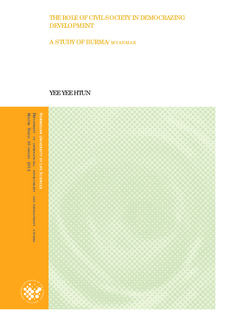| dc.description.abstract | This paper presents as a qualitative research to describe and to analyze the role of civil society in democratizing development in a study of Burma. The contextualization approach for understanding my study is the concepts of civil society, democratization and development. The research explores the empirical phenomenon of the challenges of civil society organizations in Burma/Myanmar under the control of the authoritarian regime and how much civil society actors could work for civil rights and development in local and national level. Then, the research explored the position and action of Burmese civil society organizations in Thailand, and how they could support civil society organizations and actors inside Burma/Myanmar. The hypothesis of this study is “A strength civil society and democratization” research. The research employed “a case study design” with critical type (Bryman, 2008, P.52-53) to better understand the role of civil society in democratizing development in a case of Burma/Myanmar. As a case study design, this qualitative research in the case of Burma/Myanmar studied of particular social groups, Burmese civil society actors and a specific institution, called Vahu Development Institution, based in Bangkok, Thailand. Field work for the research project was conducted in Bangkok, Chiang Mai and Maesot, Thailand, where many Burmese civil society organizations are based and where Burmese civil society actors from inside Burma/Myanmar usually come for training. This is the place where I could interview them. The research design included face to face in-depth, semi-structured and unstructured interviews as well as phone and e-mail queries, focus groups discussion, and document analysis. Recently, the new Myanmar government is founded as parliamentary government after 2010 election and it does little to end the army's dominance in Burmese politics. I hear the news that there is reducing restrictions on media and some business in Burma/Myanmar through mass media and social media. It is widely considered to be a charade that has little hope for a genuine transition from an authoritarian system to a full-fledged democracy. However, there is still strong footing of authoritarianism in Burma/Myanmar, constitutionally and practically. At that point, many Burmese civil society actors, Burma expert and scholars are hopeful that the recent reemergence of the civil society in Cyclone Nargis disaster in 2008 will contribute to the eventual transition to democracy as a force group. Today, the scholars strongly consider strengthening civil society in Burma/Myanmar. This study therefore examined the extent that the Burmese civil society organizations contribute and shape development and democratization in Burma through their pronounced strategies, missions and visions. | no_NO |




